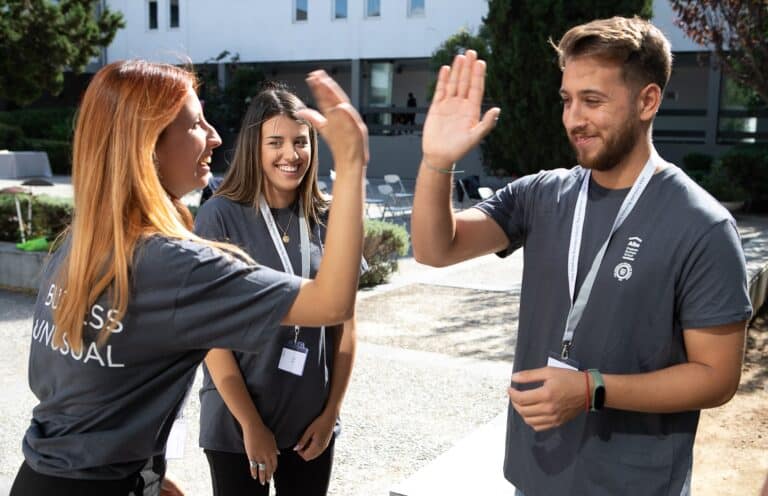Does it really make sense to pursue postgraduate studies in literature?
Nowadays, literature-related degrees are still sub estimated in a certain way. There are a lot of those students that, despite their interests, prefer to choose some other degrees in order to guarantee themselves supposedly better professional opportunities or a better future. But does it really make sense to take away from ourselves something that we really like, something what we really have a passion for and something that can awaken interests in us day by day?
Before making any conclusions, the best thing we can do is to ask someone who years ago took the decision to dedicate her life to Spanish Philology studies, a degree closely related to literature. And today, that person would be Gracia Morales: writer, playwright and a literature professor at the Faculty of Humanities at the University of Granada. She’s someone who lives immersed in the world of Humanities and someone who decided to convey her passion to dozens of students each and every single day, and today, we will be able to read some of her valuable advice through this interview.
Why is it so important to study literature? What can it bring to the students?
“Literature makes use of a very complex tool of a human being, which is the word. For me, literature is the most excellent, esthetic, beautiful and effective use of the word, and at the same time, the word is something which is essential to human’s thinking”, says Gracia Morales. She considers literature as something that enables us to decode every single text, as something that can awaken a critical spirit in us and as something that can help us to develop our imagination. As a result, literature gives us freedom, as it enables us to think about other optional worlds. In addition to that, she explains the concept of otherness as a way of getting closer to the personal experience of others. What literature does is to make us feel like multiple individuals at the same time: “It’s not just you anymore. It’s you and Gregorio Samsa or Hamlet. Approaching the personal experience of all these characters makes you think about your own moral or ethic habits, it allows you to see the emotions and the dilemmas of others.”
And why is it important for the society?
“Someone who doesn’t read is more likely to be obedient, to be manipulated, have no ability of critical thinking, therefore, is less free. Someone who doesn’t reed is much more suitable for a society where workers and consumers are what’s the most comfortable for the system.”
Now that we have explained not only what’s the importance of studying literature but also what’s somehow essential to it, do you think there are some stereotypes about it?
In order to answer that question, Gracia Morales emphasizes two stereotypes she thinks are the most common.
On the one hand, she says there is some kind of fear towards literature analysis. Even before any attempt, students tend to reject to do it because literature, in general, seems to be too difficult or even impossible to understand. But she also says that even if some texts might be more complex than others and might require a lot of effort while understanding and analyzing them, it doesn’t mean it’s impossible. In fact, there needs to be that formal and conceptual complexity into the literature work we’re analyzing if we really want to benefit from doing so. As Gracia Morales thinks: “If it says something that’s obvious, why would I reed it, why would I want to know it if it’s going to tell me something I already know?”
On the other hand, she mentions that literature has often been related to Bohemia or madness. However, she explains that “literature always comes from intelligence, hard work, rigorousness and demand and a reader who approaches the literature also has those qualities.”
As you have already said, one of the most common professional opportunities for literature students is to become a teacher, which enables them to convey to their students all the values we have been talking about. But what if there are some student’s for whom teaching is not their vocation? What other possibilities do they have?
“There are people who managed to put together publishing houses or libraries, there are also those who work in cultural management. Having studied language and literature helps them to be better readers, readers with critical thinking, and therefore it leads them to a better understanding of which texts are more likely to be working for the public and why.”
On the other hand, she mentions the possibility of working in journalism, but also as a creative writer. “It’s very difficult to write a valuable literature text if you’re not a good reader. A writer, before becoming a writer, is a reader. A reader of other, but also a reader of himself or herself.” However, she mentions the difficulty of making a living exclusively with these professions, which doesn’t mean you can’t do it simultaneously with other jobs.
Once graduated from a literature degree, what do you consider as a better option: finding a job or continuing your studies in a postgraduate program? Does it really make sense to pursue postgraduate studies in literature? What are the options?
Gracia Morales says that a postgraduate program offers you the possibility to get deeper into the topics you’re interested in, to become a specialist in your particular field. But at the same time, she thinks it’s up to every single one’s interests, might it be finding a job or choosing to do a postgraduate. She also doesn’t like to see that kind of decisions as something so unflexible: “I’ve always thought that the paths are not drawn previously.”
As for the different options, she mentions the possibility of doing a master’s in higher education, higher studies of literature or language, or teaching a foreign language. She also points out that recently, there is also a possibility of doing a masters in creative writing.
Is it true that once you chose to do a Ph.D., you’ve shut down the bridges to some other options?
“No, I don’t think so. A Ph.D. and a job are not incompatible. There’s not a path that has been drawn previously, you don’t enter the path and it’s like a trench with walls on both sides. As Machado said: you make the path as you go. You still have time to change it at any moment. We shouldn’t be afraid of the change. I think that every single person has to choose the path they honestly think is going make them happy.”
What final advice would you give to all the students that are considering choosing a literature degree or even a Ph.D.?
“The advice I would give to them is that it’s a good idea to do your best in order to achieve a good professional opportunity or a scholarship, but it’s also crucial that you do something you really like, what you really feel passionate about, because, during your studies, you will have to dedicate a lot of your time to it.”
As for the conclusion, we must say a big thank you to Gracia Morales for her motivational contributions. We hope they’ve been beneficial for you and will help you to choose where to start or how to continue your path. Finally, we would like to end up quoting her own words: “You never stop learning new things about literature. By reading and thinking, you will always continue to learn, because the literature is something that’s impossible to embrace entirely. It never ends.”
If you have some personal experience or concerns related to studying literature at university, we would be more than happy to be able to read your contributions in the comments section below!
Recent Posts

Although it's possible to sail through university without giving a thought to what you're going to do afterwards - concentrating only on enjoying ...

Ever thought about studying in Greece? Between the sunny weather, incredible history, and breathtaking coastline, you could also get a top business ...

Norway: it's a land of awe-inspiring nature, adrenaline-inducing outdoor sports, and picturesque cities. But have you ever thought about studying ...

